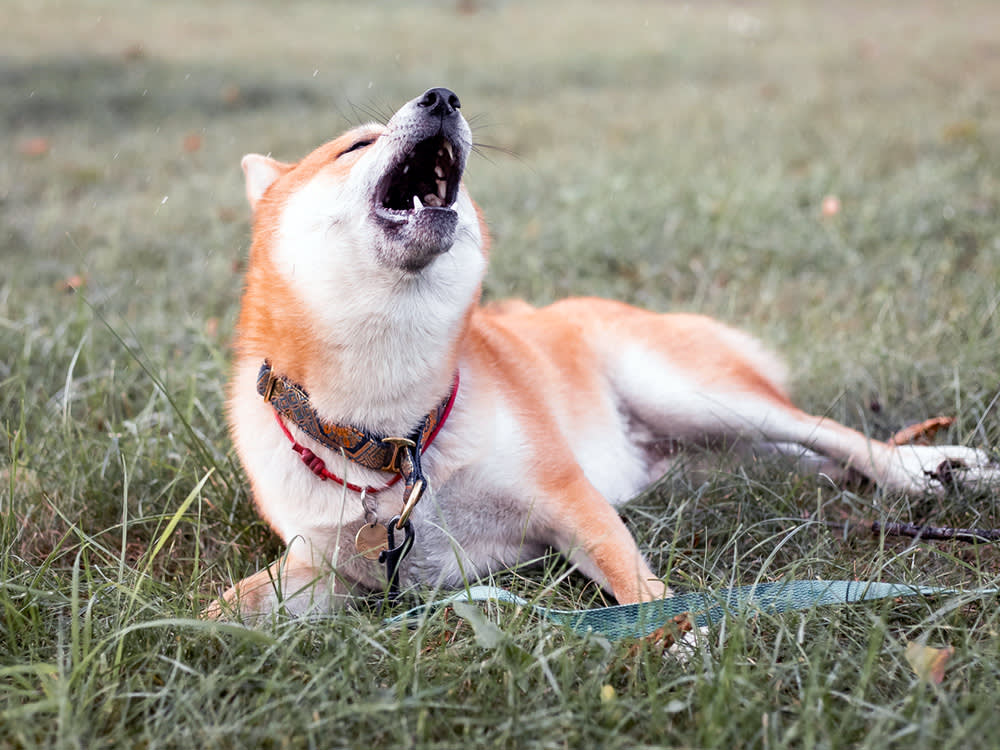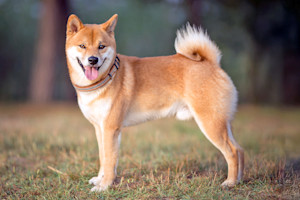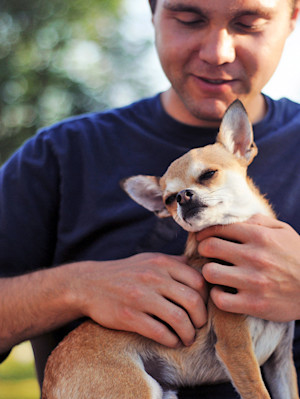What Is the ‘Shiba Scream,’ and Why Do Shiba Inus Do It?
Loving one of these dogs means investing in some good earplugs.

Share Article
Some dogs express their excitement by wagging their tails. Others like to jump up and down and twirl around. But Shiba Inus? They scream bloody murder instead.
The “Shiba Scream” is legendary for a reason. It’s loud. It’s guttural. It sounds like it comes not from a part of these dogs’ bodies, but straight from the underworld itself. Judging by these pups’ size, one would think that reaching this decibel level would be impossible, but nevertheless, the shrieks persist.
Like so many canine vocalizations, the Shiba Scream appears to be a multifaceted communication tool. Sometimes, neighbors set it offopens in new tab. Sometimes, they let one out during playtimeopens in new tab or while receiving a sweet head patopens in new tab. Sometimes, they use it to protest a nail trimmingopens in new tab. And sometimes, they seem to do it just because.
One thing we do know? This isn’t some made-up TikTok trend. “I can confirm it’s very real,” says Dr. Huyn Han with TelaVets.comopens in new tab, “and very loud.” So let’s unpack why Shibas do this — and whether it’s ever cause for concern.

What is the “Shiba Scream?”
Not quite a bark and not quite a howl, the “Shiba Scream” is a high-pitched, often dramatic vocalization that Shiba Inus usually emit when they’re feeling excited, stressed, scared, or frustrated. According to Dr. Han, “What makes it unique is the intensity.”
While that might be true, this writer might argue that the real X factor here is the vocal range. A pitch for TikTokers everywhere: Please feel free to start a web series called Shiba-merican Idol at any time.
Why do Shibas scream?
Like most of us, Shiba Inus generally scream when they’re feeling big feelings.
Although these pups’ screeching can often express fear or anxiety, Dr. Liza Cahn, a veterinarian at Embrace Pet Insuranceopens in new tab, says this behavior can also reflect intense joy. Yes, it might be “startling” at times, but generally, Dr. Cahn says, “this type of vocalization is considered a normal form of communication for [a] breed that is characterized as dramatic, expressive, and independent.”
Dr. Han put it another way, saying that Shibas often scream instead of barking or whining “when they feel strongly about something—like being picked up, restrained at the vet, or even seeing a leash.” In fairness to these dogs, I’d also probably scream if anyone did any of those things to me.
How can you rule out pain?
Most of the time, if you hear a Shiba Inu screaming, they’re just being theatrical. “Think of it less like a warning sign,” Dr. Han says, “and more like a very opinionated toddler throwing a tantrum.”
Still, as adorable as this behavior might be, it’s important to ensure that there are no underlying causes for concern. “From a veterinary perspective,” Dr. Han says, “it’s important to rule out any physical discomfort, especially if the behavior is new or seems to happen during handling.”
Dr. Han recommends looking for patterns first: “If a Shiba screams only in specific situations — like nail trims, baths, or being picked up — it’s worth considering whether those actions are causing physical discomfort.”
Think of it this way: If your Shiba always and perhaps even only starts screaming when you begin lifting them up under their chest, you might want to check with their vet for rib or spinal sensitivity. If the behavior often happens during grooming, you could check for skin conditions, mats, or joint pain. If your pup has never done this before and suddenly starts, the vocalizations could be their way of alerting you to arthritis or injury — especially if they’re getting older.
When should you see a professional?
If you’re struggling to figure out if your dog’s behavior patterns signal a deeper issue, Dr. Cahn suggests looking at their body language, context, and environment.
Happy body language could include:
Loose posture
Soft eyes
Floppy ears
Relaxed, wagging tail
Stressed-out body language could include:
Stiff posture
Rapid eye movement or wide “whale” eyes
Ears pricked up or pinned back
Tail sticking straight up or wagging sharply
As for context, again, consider what your dog was doing before and after the scream. For example: Do you often notice your Shiba letting out a piercing shriek every time you try to trim their nails, or every time they hear fireworks, or during bath time? In these cases, you might ask a behaviorist or trainer to help you with desensitization and counterconditioning. These techniques will help your pup process these triggers more peacefully.
“Positive reinforcement training and socialization, especially during puppyhood, can help reduce the frequency of screaming,” Dr. Cahn says. But if the behavior begins suddenly, she agrees with Dr. Han that it’s important to check in with your vet and make sure your dog is not experiencing any pain or medical issues.
“A thorough physical exam helps us check for tenderness, inflammation, or mobility issues,” Dr. Han says. “If we find anything concerning, we might recommend X-rays or blood work to rule out orthopedic or systemic problems.”
If you’ve seen your vet and they’ve found no signs that your dog is screaming because they’re in pain or dealing with a medical problem, then you can be more assured that the behavior is an emotional response to specific situations.
“That’s when we look at anxiety, frustration tolerance, and how the dog perceives handling or restraint,” Dr. Han says. Depending on how severe and persistent the behavior is, Dr. Cahn suggests that anti-anxiety medications could provide some relief.
By taking the time to check in, pet parents can make sure their dogs are happy and healthy, and that they’re simply using their voices to let us know how they’re feeling. As Dr. Han puts it, “we want to listen to what they’re telling us — but also take the time to decode what they really mean.”
Still, rest assured: If your dog loves to scream, it’s very possible that there is no deeper cause for concern. According to Dr. Han, “Some Shibas just have a low threshold for what they consider offensive.” I’m guessing they might argue that we humans are actually just way more annoying than we realize, but hey, tomato, to-mah-to, scream-ato, scream-AAAAAAHHHH-to.

Laura Bradley
Laura is a New York-based experienced writer and mom of two rescue pups. Her work has appeared in Slate, Vanity Fair, Daily Beast, The Washington Post, The Atlantic, Yahoo! News, Vulture, Grazia Magazine, and more. When she is not writing or walking the pooches, you will probably find her in the community garden.
Related articles
![Shiba Inu dog standing outside in the grass.]()
15 Dog Breeds Known for Having Curly Tails
And, as a result, being the cutest.
Why Do Dogs Howl to Music—And Can They Really Match Pitch?
If you’re wondering what’s up with those viral singing TikTok dogs, we have the facts.
Every Dog’s Biggest Warm Weather Need, According to Their Breed
Here’s how to make sure your pup enjoys summer to the fullest.
Why Your Dog Doesn’t Bark: Possible Causes And What to Know
And what you can do about it.
![Man hugging his cute Chihuahua dog.]()
10 Dog Breeds with the Longest Lifespans
Because we all wish our pets could live forever.
![A dog running with a woman on a pier.]()
8 Questions to Ask Yourself When Choosing a Dog Breed
Find out which dog breed is right for your lifestyle.





